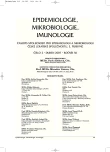-
Medical journals
- Career
Urinary Tract Infections in Children Caused by Uropathogenic Strains of Escherichia coli and the Role Of The Innate Immune Response Mediated by the Toll-like Receptor 4 and Antimicrobial Peptide Cathelicidin in their Clinical Course
Authors: A. Liptáková 1; Podracká; Ľ. 2; L. Siegfried 1
Authors‘ workplace: Ústav lekárskej mikrobiológie LF UPJŠ Košice 1; 1. Klinika pre deti a dorast LF UPJŠ Košice 2
Published in: Epidemiol. Mikrobiol. Imunol. 56, 2007, č. 2, s. 72-77
Overview
Uropathogenic Escherichia coli (UPEC) are the causative organisms in more than 80% of urinary tract infections. The bacteria are introduced to the urinary tract that, except for the external part of the urethra, is free from microbial colonization, and thus can cause acute, potentially life-threatening infections with possible progression to chronic disease. The course of such infection depends not only on the agent involved but also on the activation of protective mechanisms. The recently described Toll-like receptor family and antimicrobial peptide cathelicidin appear to play an important role in the recognition and activation functions.
Key words:
urinary tract infections – uropathogenic Escherichia coli – Toll-like receptor 4 – cathelicidin.
Labels
Hygiene and epidemiology Medical virology Clinical microbiology
Article was published inEpidemiology, Microbiology, Immunology

2007 Issue 2-
All articles in this issue
- Pertussis: a Reemerging Infection?
- Clinical Specimens for PCR Detection of Syphilis
- Urinary Tract Infections in Children Caused by Uropathogenic Strains of Escherichia coli and the Role Of The Innate Immune Response Mediated by the Toll-like Receptor 4 and Antimicrobial Peptide Cathelicidin in their Clinical Course
- Effectiveness of Aerial Application of VectoBac G Larvicide Granules Against Mosquitoes in the Olomouc Region in Spring 2006
- Monitoring Genes Encoding Panton-Valentine Leukocidin in Staphylococcus Aureus Strains
- Epidemiology, Microbiology, Immunology
- Journal archive
- Current issue
- Online only
- About the journal
Most read in this issue- Monitoring Genes Encoding Panton-Valentine Leukocidin in Staphylococcus Aureus Strains
- Pertussis: a Reemerging Infection?
- Effectiveness of Aerial Application of VectoBac G Larvicide Granules Against Mosquitoes in the Olomouc Region in Spring 2006
- Clinical Specimens for PCR Detection of Syphilis
Login#ADS_BOTTOM_SCRIPTS#Forgotten passwordEnter the email address that you registered with. We will send you instructions on how to set a new password.
- Career

